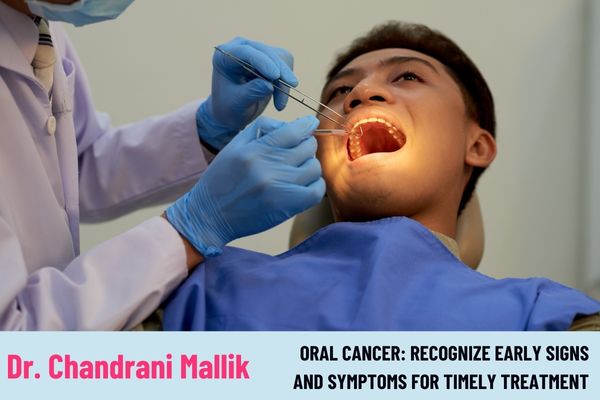Oral Cancer: Early Warning Signs and Symptoms You Shouldn’t Ignore
Oral cancer is a potentially life-threatening disease that often goes undiagnosed until advanced stages. With expert guidance from Dr. Chandrani Mallik, a renowned oncologist specializing in oral cancers, this blog aims to raise awareness about the condition, highlighting the importance of early detection and timely treatment.
Understanding Oral Cancer
Oral cancer, a subset of head and neck cancers, develops in the tissues of the mouth and throat. It can affect the lips, tongue, gums, inner cheeks, or palate. While it is most common in individuals over 40, it can occur at any age, especially if risk factors are present.
Early Warning Signs of Oral Cancer
Spotting oral cancer in its early stages increases the likelihood of successful treatment. Be on the lookout for these symptoms:
- Persistent Mouth Sores: Ulcers or sores that do not heal within two weeks.
- Red or White Patches: Abnormal discoloration on the gums, tongue, or mouth lining.
- Unexplained Bleeding: Bleeding in the mouth without any visible injury.
- Lumps or Swelling: Growths or thickened areas in the mouth or neck.
- Difficulty Swallowing: Pain or discomfort while eating or drinking.
- Voice Changes: Persistent hoarseness or changes in speech.
- Jaw Pain or Stiffness: Difficulty moving the jaw.
- Loose Teeth: Without any apparent dental cause.
Risk Factors for Oral Cancer
Dr. Chandrani Mallik emphasizes that several factors increase the risk of developing oral cancer, including:
- Tobacco Use: Smoking or chewing tobacco remains the leading cause.
- Excessive Alcohol Consumption: Increases the risk, especially when combined with tobacco.
- HPV Infection: Human papillomavirus is a significant contributor.
- Prolonged Sun Exposure: Particularly for cancers of the lips.
- Poor Oral Hygiene: Neglecting dental health can contribute to risk.
- Dietary Deficiencies: Lack of essential vitamins and nutrients.
The Importance of Early Detection
According to Dr. Chandrani Mallik, early diagnosis is critical for effective treatment and recovery. Regular dental checkups and awareness of symptoms can help detect abnormalities early. If you experience persistent symptoms, do not hesitate to consult a specialist.
Prevention Tips for Oral Cancer
- Avoid Tobacco and Alcohol: Quit smoking and limit alcohol consumption.
- Practice Good Oral Hygiene: Brush and floss daily, and visit your dentist regularly.
- Protect Your Lips: Use sunscreen or a lip balm with SPF.
- Get Vaccinated Against HPV: Reducing the risk of HPV-related cancers.
- Maintain a Balanced Diet: Include antioxidant-rich fruits and vegetables.
Treatment Options for Oral Cancer
Dr. Chandrani Mallik highlights that treatment options vary depending on the cancer stage:
- Surgery: Removal of the cancerous growth.
- Radiation Therapy: Using targeted radiation to destroy cancer cells.
- Chemotherapy: Medications to kill or slow the spread of cancer cells.
- Targeted Therapy: Focuses on specific cancer cell vulnerabilities.
Insights from Dr. Chandrani Mallik
Dr. Mallik emphasizes the role of education and awareness in preventing oral cancer. “Many cases can be avoided or treated effectively with early diagnosis. Regular self-examinations and professional screenings are vital,” she explains.
Final Thoughts
Oral cancer is a severe condition, but awareness can make all the difference. By recognizing the early warning signs of oral cancer, adopting healthy habits, and seeking expert guidance from specialists like Dr. Chandrani Mallik, you can take proactive steps toward prevention and early intervention.
If you or someone you know is experiencing symptoms, consult a healthcare professional immediately. Early action saves lives.

